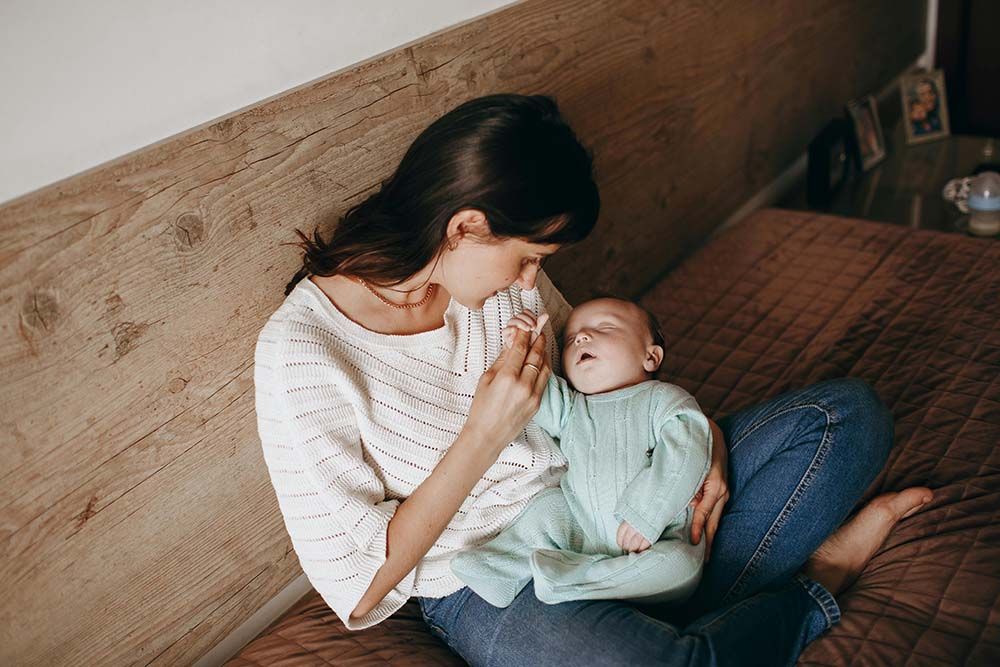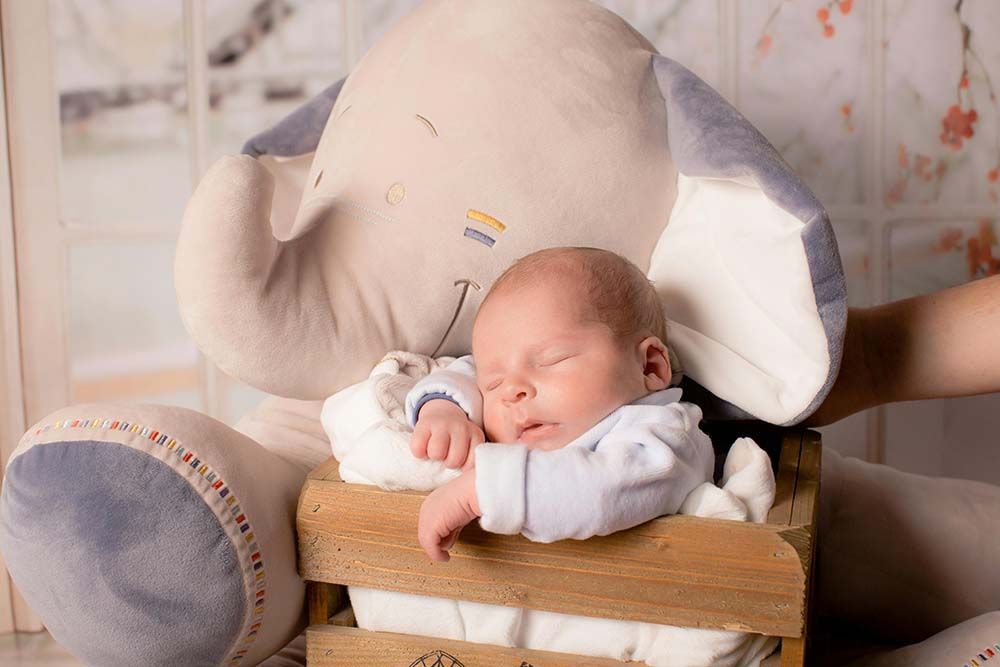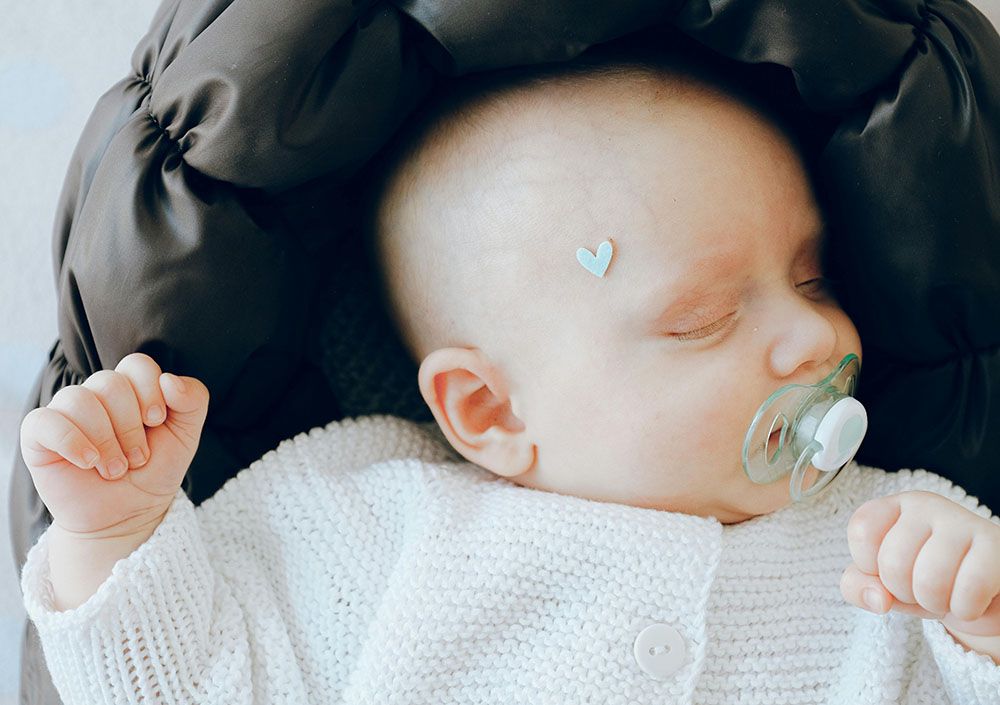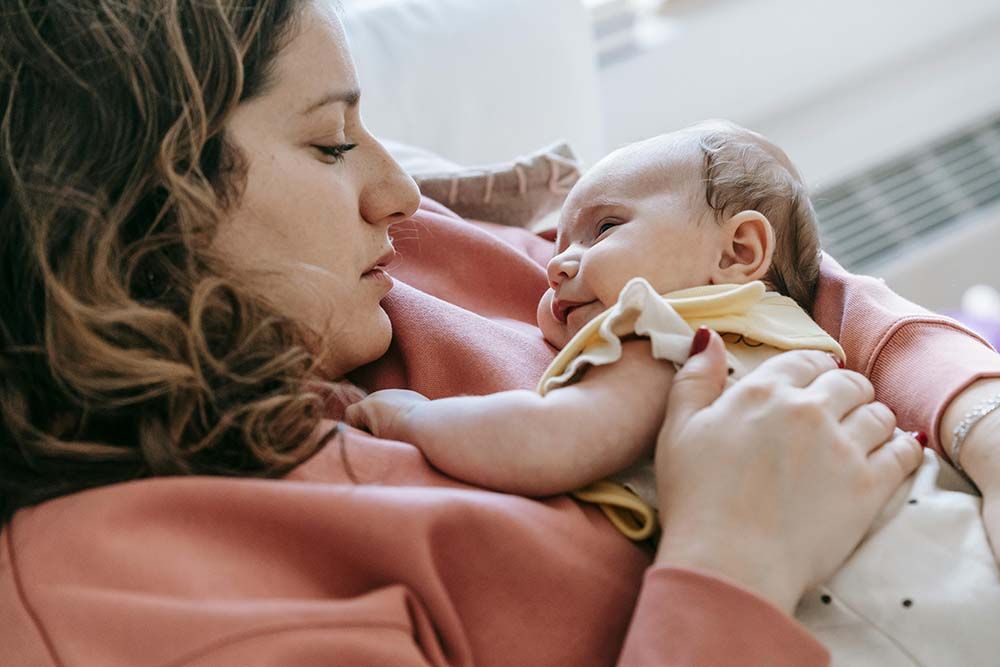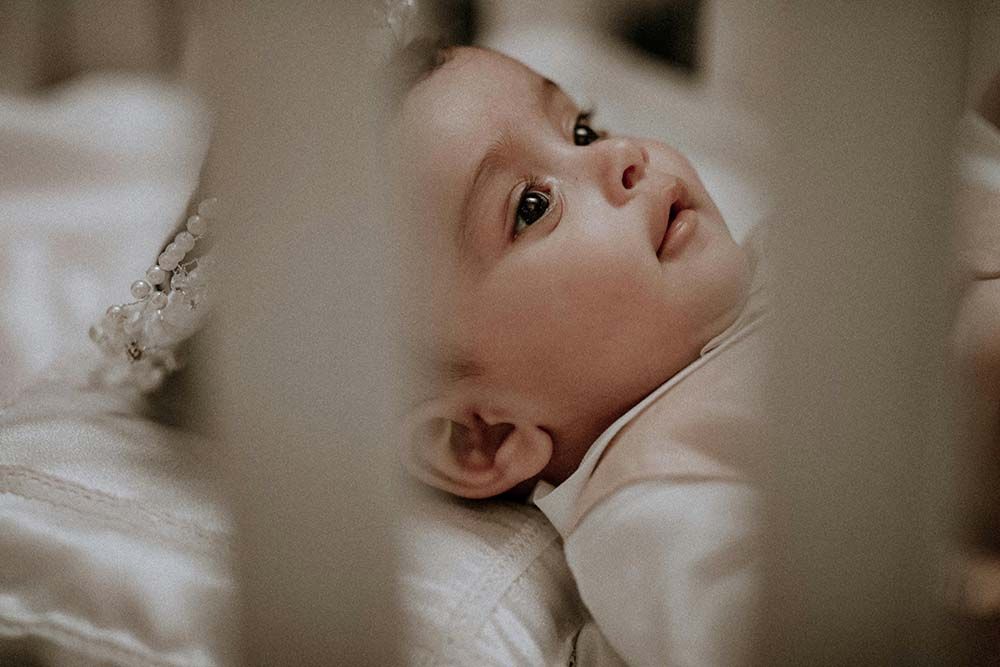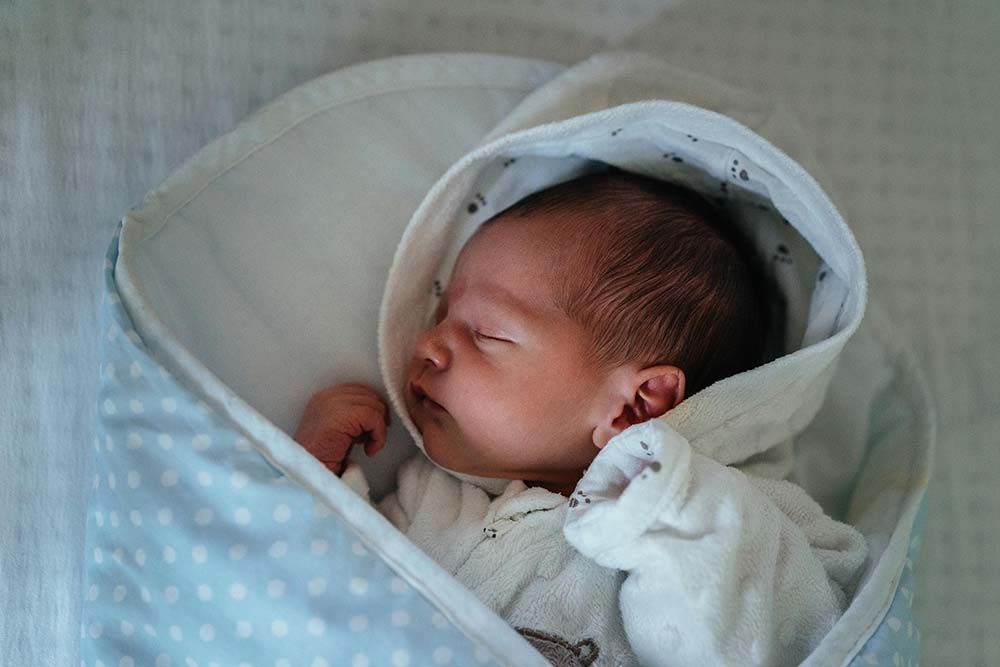

At 11 months, babies are typically more active and curious, exploring their environment with newfound mobility and awareness. This increased activity, coupled with significant developmental milestones, can influence their sleep patterns. A well-structured sleep routine helps regulate their internal clock, ensuring they get the rest they need for healthy development. Read on for more details.
As babies grow, understanding their sleep schedule and wake windows are necessary. However, every baby has different sleep needs and even an individual's sleep needs and patterns are changing relentlessly. So it is important to seek help for some AI helpers, such as Moonycare, a powerful parenting app that makes foster babies easily. By tracking your baby's sleep habits, it will automatically predict an appropriate sleep schedule for your baby specifically.
IN THIS ARTICLE:
What are Wake Windows for an 11 Month Old?
A Sample Sleep Schedule for 11 Month Old Babies
How Much Should an 11 Month Old Sleep?
How Long Should an 11 Month Old Nap?
How Many Naps are Suitable for an 11 Month Old?
What Time Should an 11-Month-Old Go to Bed?
Can an 11-Month-Old Baby Sleep Through the Night?
Can you Sleep Train an 11-Month-Old?
Is there Sleep Regression for 11 Month Old Babies?
What are Wake Windows for an 11-Month-Old?
For an 11-month-old, wake windows generally range from 3 to 4 hours. This duration tends to be shorter in the morning when babies are often more tired after a night's sleep. As the day progresses, these windows may extend slightly.
An appropriate wake windows can avoid overtiredness effectively, keeping baby from hard to fall asleep. If you notice that babies start to rub their eyes, yawn, become fussy or other tiredness signs, you can put your baby down for naps or bedtime before they become overtired.
Sample 11-Month-Old Sleep Schedule
Here's an example of a typical day for an 11-month-old:
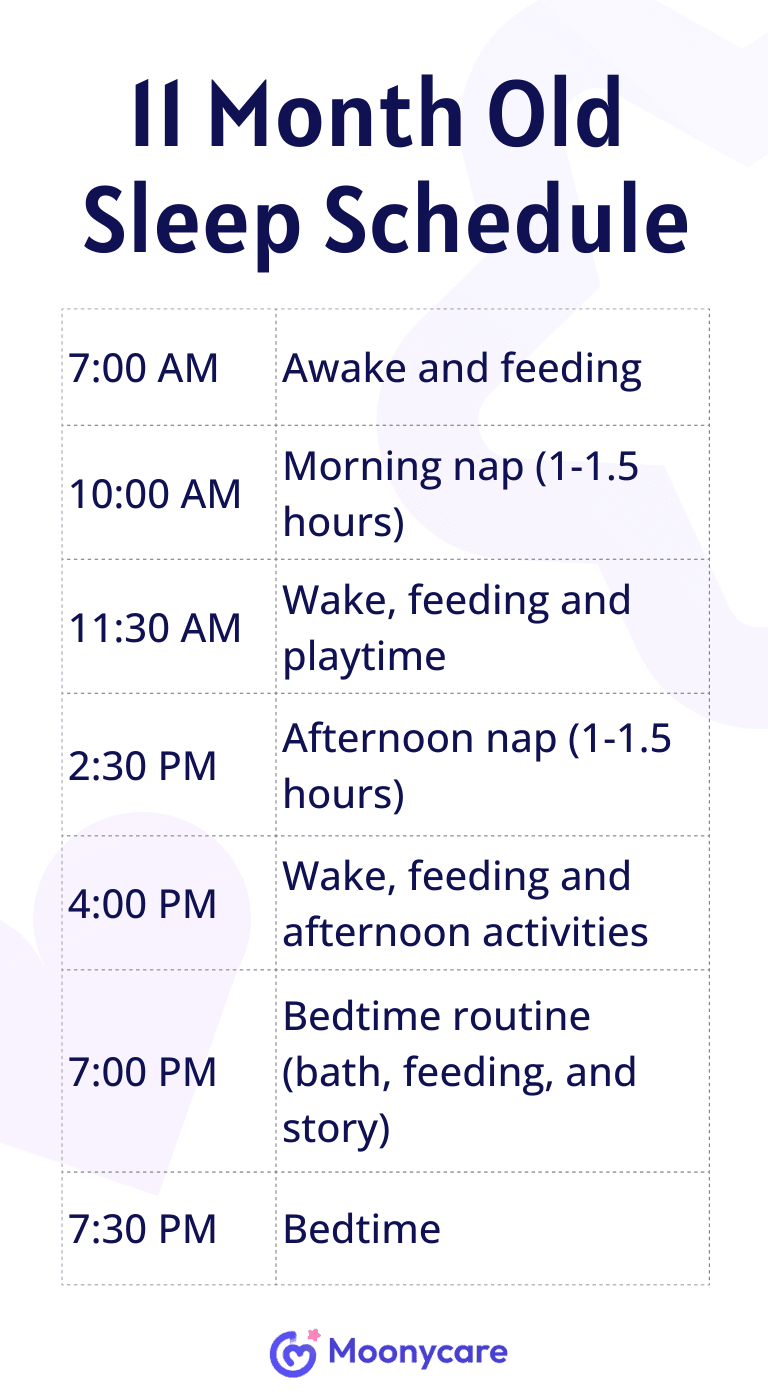
It's important to note that while this schedule provides a general guideline, parents should adjust it based on their child's specific needs and cues. Flexibility is key, as each baby has unique sleep patterns and requirements.
How Much Should an 11-Month-Old Sleep?
At 11 months, most babies need around 13 to 14 hours of sleep per day. This typically includes approximately 11 to 12 hours of sleep at night, with the remaining hours spread across daytime naps. Adequate sleep is crucial for cognitive and physical development.
It's essential to ensure that both nighttime and daytime sleep are balanced. Some babies may sleep a lot during daytime, but don't want to sleep at night. Thus, parental observation is important, monitoring their baby's sleep patterns and adjusting the schedule as needed to ensure they are well-rested and happy.
How Long Should an 11-Month-Old Nap?
Naps are an essential part of an 11-month-old's sleep routine, helping them recharge and avoid overtiredness. Typically, babies at this age take two naps per day, with each nap lasting between 1 to 1.5 hours. The morning nap often tends to be shorter, providing a quick refresh after the initial wake-up. The afternoon nap can be longer, helping the baby recharge for the rest of the day.
It's important to manage the total nap time carefully. While some babies may naturally take shorter naps, others might need longer periods of rest. However, the total nap time should ideally not exceed 3 hours to ensure the baby is tired enough to sleep well at night.
How Many Naps are Expected for an 11-Month-Old?
At 11 months, babies typically take two naps per day. As babies grow, their sleep needs gradually decrease, and they can stay awake for longer, which is called the transition period. This period requires careful observation and adjustment to the baby's sleep schedule. Parents should be attentive to signs that their baby is ready to drop a nap, such as resisting one of the naps consistently or having difficulty falling asleep at night.
What Time Should an 11-Month-Old Go to Bed?
The ideal bedtime for an 11-month-old is between 7:00 and 8:00 PM. A consistent bedtime helps regulate the baby's internal clock and promotes better sleep quality. Maybe you can begin a bedtime routine to promote sleep,including giving a warm bath, reading a story, gentle rocking, and so on.
Although consistency in bedtime is important, parents should also be flexible based on their child's needs. If a baby is consistently waking up too early or struggling to fall asleep at night, adjusting the bedtime slightly earlier or later can help find the right balance.
Can an 11-Month-Old Baby Sleep Through the Night?
By 11 months, many babies can sleep through the night if they have enough milk or solid food before bedtime. However, it's normal for some babies to still wake up occasionally. There are many reasons can affect sleep, such as hunger, separation anxiety, discomfort, illness, and some developmental milestones.
Sleep Training an 11-Month-Old
Sleep training at 11 months can be beneficial for helping babies learn to fall asleep independently and sleep through the night. Several methods can be used, including the Ferber method, gentle sleep coaching, or the cry-it-out method. The choice of method depends on the parents' comfort level and the baby's temperament.
The goal of sleep training is to create a consistent sleep environment and routine that encourages self-soothing. This process may involve gradually reducing the amount of parents' intervention at bedtime and night wakings. Since babies have a strong reliance to the around people's care, it needs some time for babies to adapt to new sleep habits. Being patience and consistency is important at this period.
Does an 11-Month-Old Have Sleep Regression?
Around 11 months, sleep regression can occur due to separation anxiety and developmental milestones such as increased mobility, language acquisition, and cognitive growth. These changes can disrupt sleep patterns, and some sleep problems will emerge, such as resisting naps, waking up frequently at night, or having difficulty falling asleep.
During this period, parents should maintain a consistent sleep routine and offer comfort and reassurance to their baby, which is the crucial. While sleep regressions can be challenging, they are usually temporary and can be solved as the baby adjusts well to new developmental stages.
11-Month-Old Sleep Tips
To help an 11-month-old sleep well, consider the following tips:
Consistent Routine: Establish a predictable and calm bedtime routine to signal bedtime.
Calm Environment: Create a quiet, dark, and cool room to promote restful sleep.
Comfort Objects: Introducing a favorite blanket or stuffed animal can provide comfort and security.
Avoid Overstimulation: Avoid exciting activities before bedtime to help the baby wind down.
Watch for Sleep Cues: Focus on the signs of tiredness and put the baby down for sleep before they become overtired.





